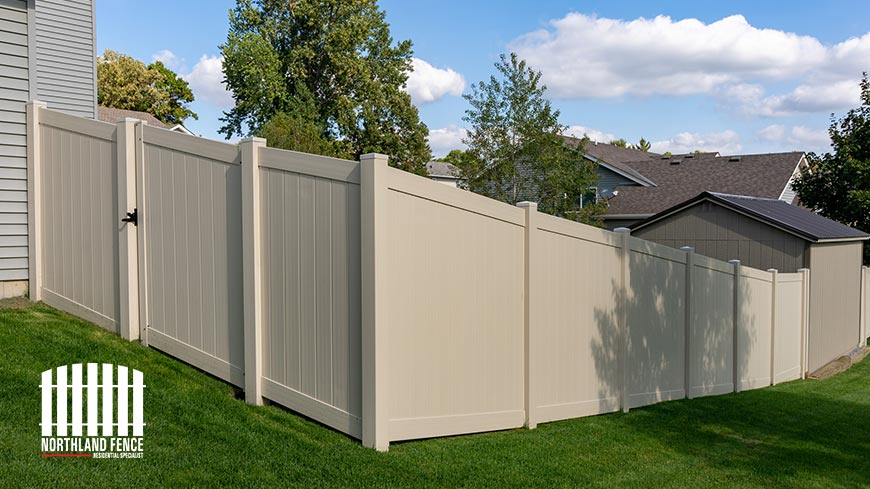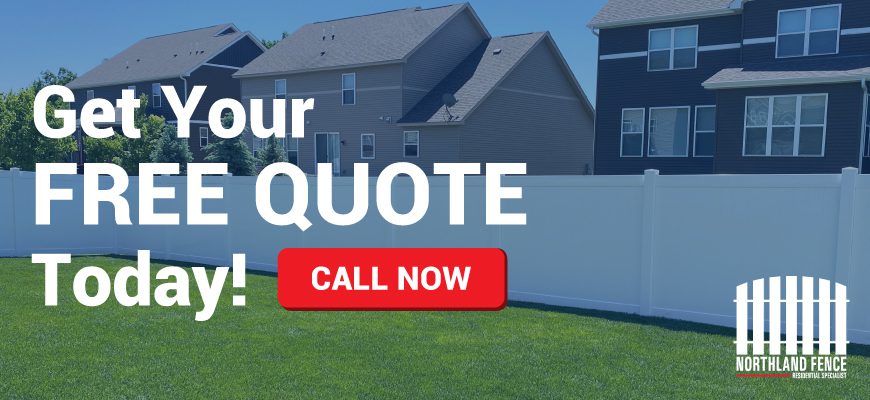Have you ever just wanted to tell your neighbor, “Shut up!”? I think we’ve all been there, and it’s not just the neighbors, either. It always seems like you can hear everything and everyone on your street at all times. It can get so annoying.
Luckily, there are ways to mitigate all that noise without telling your neighbors to shut their mouths. Northland Fence wants to present you with some sound barrier fences.
What to Consider When Buying a Sound Barrier Fence
Before buying a sound barrier fence, there are some factors that you need to consider. Not considering these factors may result in even more stress because not only are the neighbors keeping you up, you’ll be thinking, “I shouldn’t have paid money for a sound barrier that doesn’t work!”
Height
Your fence should be tall enough to block the sound. If the fence is lower to the ground, then there won’t be much reduction of noise as short fences don’t block sound waves. Something to keep in mind: If you can see the source of a sound, you’ll be able to hear it. A tall fence will help this problem, but make sure that you legally can put up a tall fence. Depending on the law of the land, it could attract the wrong type of attention from a homeowners’ association.
Construction of the Fence
No matter how tall the fence is, it really doesn’t matter if there are some big gaps within it. The construction of the fence matters just as much. For a good sound barrier, you will want a fence that has no space between the boards. It is also important to make sure there are no gaps at the bottom of your fence, either. Noise from the street will make its way through those gaps.
Sound Resistant Materials
Let’s say you don’t want to go through constructing a sound barrier fence. Luckily, Northland Fence can help you and give you a quote. However, let’s say you don’t want to even pay for another fence right now. Well, there are always sound resistant materials.
There are several types of sound resistant material to choose from, such as sound blankets or mass-loaded vinyls. These can be built into the fence to block out more noise than your pre-existing fence. Now, your existing fence will have to go through some remodeling. These materials must be added on between two layers of fencing, so you’ll need renovations but not an entirely new fence. This option would be optimal if your noise is from an HVAC system or if you just don’t want to buy a fence.
The Best Type of Fence for Noise Reduction
Now that we’ve discussed what to consider when buying a fence, let’s talk about the best types of fences to buy for sound barriers. There are several types of fences, and some will work much better than others for noise reduction. Let’s break each down and see why ones work better than the others.
Chain Link Fences
A chain link fence is the cheapest type of fence that one could buy and is probably the fence that is flexible for most of your needs. However, this type of fence has several gaps within it, which makes it difficult to block sound. That said, you may already have a chain link fence up, so the best course of action would be buying some sound resistant materials.
Nature’s Fencing
This would be a wall of bushes and trees. Sometimes, nature can be your fence! Aesthetically, it would look super nice since it is a fence without a fence. It also is an environmentally friendly solution, so this sounds perfect, right? Well, there are a couple of downsides.
First, this is the type of fence that takes years to plan. Bushes won’t be built in a day, and we know that a sound barrier is immediate. A natural fence also takes a little bit more time on your part as you have to regularly water it and take care of the plants. The other issue is that it can still be unreliable. A natural fence may look like a solid wall, but there will still be some gaps in between that you won’t see until the plants grow.
Metal Fences
Metal fencing has the easiest installation, is relatively affordable, and sound absorbing material can be added to the side of the fence facing the noise, which would increase the effectiveness. However, these are still the least effective sound barrier as you will be able to hear the fence when it is windy outside, they are not as durable because they can rust easily, and they just aesthetically don’t look good. While looks aren’t everything at Northland Fence, we want to make sure that your fence is in good condition.
Wooden Fences
The most popular type of fence in Minnesota, a wooden fence is one of the best options for a sound barrier. These are easy to install and affordable, and also have the potential to have “tongue and groove” technology. This simply means that each board fits snugly together with each other. As long as you don’t get a picket fence, wooden fences are a great option. There are a couple downsides to this fence, though.
First, the effectiveness of a wooden fence is dependent on the type of fence you buy. If you were to buy a picket fence, which are typically shorter and have several gaps between the boards, this wouldn’t do much of anything as a sound barrier. However, buying a tall wood fence with the boards close together would do wonders. There is also the fact that wood fences require a little bit more maintenance than other fences. You will want to know how to clean your wood fence, and want to replace the boards when they begin to rot. While these downsides are relatively minor, they are still factors to consider.
Brick Fences
This right here? This is the motherload of sound barriers. A brick fence is solid and extremely durable, you can add sound resistant materials on it for extra noise reduction (not that you’ll need it with a brick fence), and it is a fantastic security system. However, there are a couple downsides to this fence.
Brick fences are expensive. This would be a major investment due to the price of these fences. Speaking of investment, brick fences are difficult to repair as time goes on. This would make a brick fence even more expensive down the line. These fences are hard to install and require a big time commitment for installation.
Vinyl Fences
Vinyl fences may be one of the best fences for a sound barrier, specifically mass-loaded vinyl. Mass-loaded vinyl is heavy, and is thick, which means that it is optimal for soundproof. Not only does mass-loaded vinyl absorb the noise, it actively deflects it to the opposite direction! There are virtually no downsides to this type of fence, other than vinyl being slightly more expensive. Even with vinyl being a bit more expensive, it will last much longer and repairs will be easier than other fences. You would get more bang for your buck with these.
So, Which Fence Is The Best?
The best fence would be a brick fence since it is a solid wall that is durable, but these are very expensive to build and expensive to repair. Wood fences with “tongue and groove” technology are awesome, but they require a little more maintenance than other fences. Vinyl is a bit pricier out the gate but not as expensive as brick fences, it lasts a long time and is durable, and requires little to no maintenance. Taking all of these factors into consideration, the best fence for a sound barrier is a vinyl fence. Contact us now to get a quote!
Stopping Sounds with Northland Fence
Northland Fence is here to help you find a good sound barrier fence. Our goal is to provide you with American-made fences with exceptional customer service. We are the first company in Minnesota to use driven posts on all your fences, because it fits with our goals. Call 763-316-4881 for a consultation.
FAQs:
What type of fence is best for noise reduction?
The best pure fence for noise reduction would be a brick fence. A brick fence is a completely solid wall that is barely penetrable. While it is the most expensive option, it is also the most effective one.
How do you soundproof a backyard fence?
If you already have a fence up, there are several sound resistant materials that can be added on to the fence. You can buy mass-loaded vinyl material or sound blankets.
Can you soundproof a privacy fence?
Yes, you can soundproof a privacy fence. You may have to cut soundproof panels to fit the accurate size, but you can still soundproof your privacy fence.


